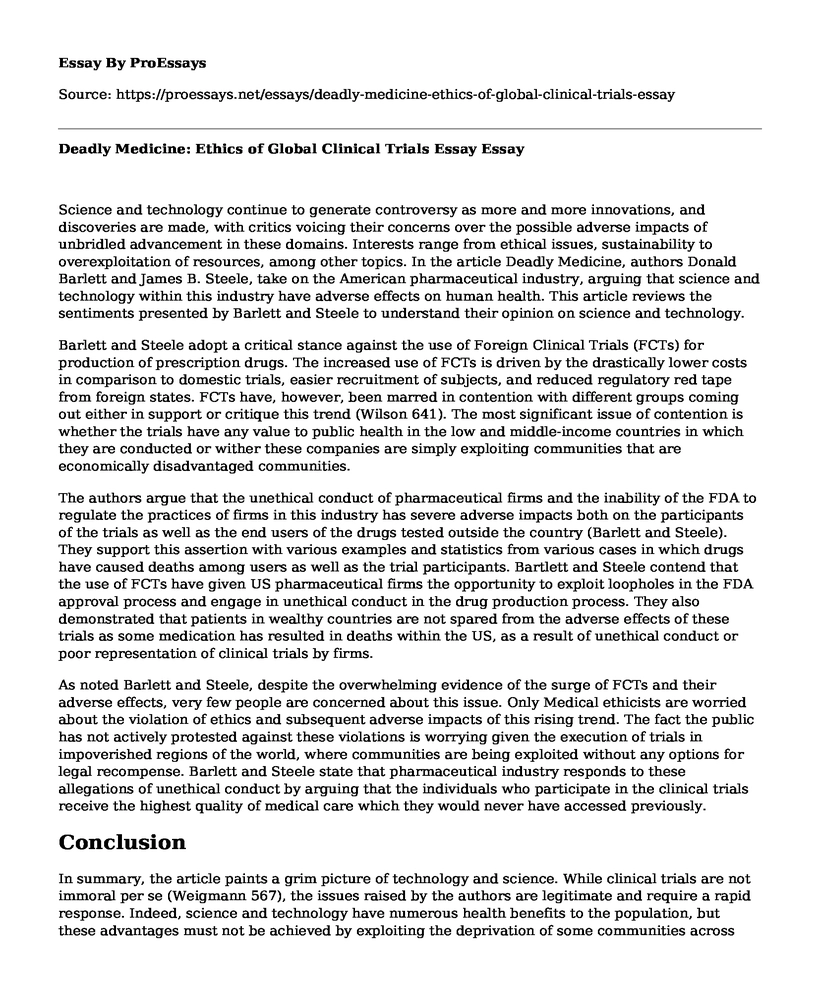Science and technology continue to generate controversy as more and more innovations, and discoveries are made, with critics voicing their concerns over the possible adverse impacts of unbridled advancement in these domains. Interests range from ethical issues, sustainability to overexploitation of resources, among other topics. In the article Deadly Medicine, authors Donald Barlett and James B. Steele, take on the American pharmaceutical industry, arguing that science and technology within this industry have adverse effects on human health. This article reviews the sentiments presented by Barlett and Steele to understand their opinion on science and technology.
Barlett and Steele adopt a critical stance against the use of Foreign Clinical Trials (FCTs) for production of prescription drugs. The increased use of FCTs is driven by the drastically lower costs in comparison to domestic trials, easier recruitment of subjects, and reduced regulatory red tape from foreign states. FCTs have, however, been marred in contention with different groups coming out either in support or critique this trend (Wilson 641). The most significant issue of contention is whether the trials have any value to public health in the low and middle-income countries in which they are conducted or wither these companies are simply exploiting communities that are economically disadvantaged communities.
The authors argue that the unethical conduct of pharmaceutical firms and the inability of the FDA to regulate the practices of firms in this industry has severe adverse impacts both on the participants of the trials as well as the end users of the drugs tested outside the country (Barlett and Steele). They support this assertion with various examples and statistics from various cases in which drugs have caused deaths among users as well as the trial participants. Bartlett and Steele contend that the use of FCTs have given US pharmaceutical firms the opportunity to exploit loopholes in the FDA approval process and engage in unethical conduct in the drug production process. They also demonstrated that patients in wealthy countries are not spared from the adverse effects of these trials as some medication has resulted in deaths within the US, as a result of unethical conduct or poor representation of clinical trials by firms.
As noted Barlett and Steele, despite the overwhelming evidence of the surge of FCTs and their adverse effects, very few people are concerned about this issue. Only Medical ethicists are worried about the violation of ethics and subsequent adverse impacts of this rising trend. The fact the public has not actively protested against these violations is worrying given the execution of trials in impoverished regions of the world, where communities are being exploited without any options for legal recompense. Barlett and Steele state that pharmaceutical industry responds to these allegations of unethical conduct by arguing that the individuals who participate in the clinical trials receive the highest quality of medical care which they would never have accessed previously.
Conclusion
In summary, the article paints a grim picture of technology and science. While clinical trials are not immoral per se (Weigmann 567), the issues raised by the authors are legitimate and require a rapid response. Indeed, science and technology have numerous health benefits to the population, but these advantages must not be achieved by exploiting the deprivation of some communities across the world. The problem with FCTs is the variation in legal frameworks of the execution of clinical trials across governments in the world and the driving factors of pharmaceutical companies to conduct the trials in specific countries.
Works Cited
Barlett, Donald, and James Steele. "Deadly Medicine." The Hive, 2011, https://www.vanityfair.com/news/2011/01/deadly-medicine-201101. Accessed 12 Sept 2018.
Weigmann, Katrin. "The ethics of global clinical trials: in developing countries, participation in clinical trials is sometimes the only way to access medical treatment. what should be done to avoid exploitation of disadvantaged populations?". EMBO Reports, vol 16, no. 5, 2015, pp. 566-570. EMBO, doi:10.15252/embr.201540398. Accessed 12 Sept 2018.
Wilson, Blake. "Clinical studies conducted outside of the united states and their role in the food and drug administration's drug marketing approval process." The University Of Pennsylvania Journal Of International Law, vol 34, no. 3/5, 2013, pp. 641-685., https://scholarship.law.upenn.edu/cgi/viewcontent.cgi?article=1040&context=jil. Accessed 12 Sept 2018.
Cite this page
Deadly Medicine: Ethics of Global Clinical Trials Essay. (2022, Aug 04). Retrieved from https://proessays.net/essays/deadly-medicine-ethics-of-global-clinical-trials-essay
If you are the original author of this essay and no longer wish to have it published on the ProEssays website, please click below to request its removal:
- Essay Example: Patient Safety Risks
- Vaccinations Pros and Cons Essay
- Alzheimer's vs Dementia Paper Example
- Nursing Shortage: Presenting the Problem Paper Example
- Depression and Smartphones: Annotated Bibliography
- Essay Sample on Health Records of Children: Parental Responsibility & Electronic Confirmation
- Essay Example on Maximizing Patient Flow in Healthcare: Its Criticality & Benefits







